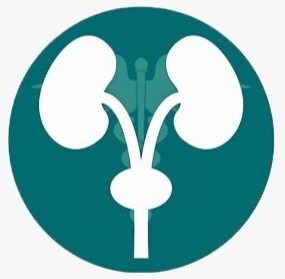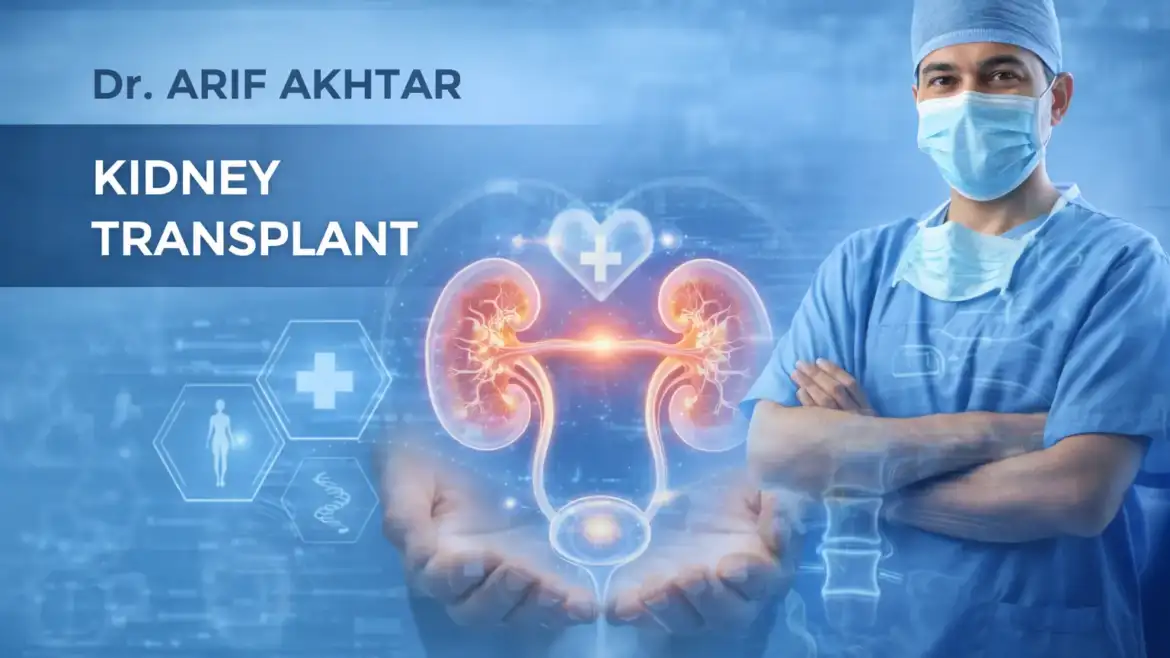A kidney transplant is a life-saving surgical procedure in which a diseased or failed kidney is replaced with a healthy kidney from a living or deceased donor. It is the most effective long-term treatment for End-Stage Renal Disease (ESRD) and offers better survival, improved quality of life, and freedom from lifelong dialysis.
If you or your loved one is suffering from advanced kidney failure, kidney transplant in Gurgaon under the care of Dr. Arif Akhtar, one of the most trusted kidney transplant specialists in Delhi NCR, can help restore health and independence.
Kidney Transplant Specialist in Gurgaon – Dr. Arif Akhtar
Dr. Arif Akhtar is recognized as one of the best kidney transplant doctors in Gurgaon, known for ethical decision-making, evidence-based care, and comprehensive transplant management.
Why patients trust Dr. Arif Akhtar:
- Extensive experience in kidney transplant care
- Strong focus on patient safety and long-term outcomes
- Expertise in pre-transplant evaluation and post-transplant care
- Trusted by patients across Gurgaon, Delhi, Noida, Faridabad, Ghaziabad, and NCR
- Consultation available at Sector 56, Gurgaon
What Do the Kidneys Do?
The kidneys are vital organs responsible for:
- Filtering waste and toxins from blood
- Removing excess fluid as urine
- Regulating blood pressure
- Maintaining electrolyte balance
- Producing erythropoietin for red blood cell formation
When kidneys fail permanently, these functions stop, leading to toxin accumulation and life-threatening complications.
What are Kidney Diseases?
Renal failure arises when the kidneys cease to function properly. If this condition persists over time (chronic renal failure), it leads to end-stage renal disease, characterized by the build-up of harmful waste substances in the body. In such cases, either dialysis or transplantation becomes necessary for treatment.
Frequent Causes of End-Stage Renal Disease:
- Diabetes mellitus
- Hypertension (high blood pressure)
- Glomerulonephritis
- Polycystic Kidney Disease
- Severe structural abnormalities affecting the urinary tract
What Is Kidney Failure & ESRD?
Kidney failure occurs when kidneys lose their ability to function adequately. When this loss is permanent, it is called End-Stage Renal Disease (ESRD).
Common Causes of ESRD
- Diabetes mellitus
- High blood pressure (hypertension)
- Chronic glomerulonephritis
- Polycystic kidney disease
- Congenital kidney disorders
- Recurrent urinary tract infections
Patients with ESRD require dialysis or kidney transplant to survive.
Why Kidney Transplant Is the Best Treatment Option
Compared to dialysis, kidney transplant offers:
- No regular dialysis sessions
- Better energy and physical capacity
- Improved life expectancy
- Fewer dietary and fluid restrictions
- Enhanced quality of life
For eligible patients, transplant is the closest alternative to normal kidney function.
Types of Kidney Transplant
Living Donor Kidney Transplant
- Donor is a healthy family member or compatible person
- Best long-term outcomes
- Planned surgery
Deceased (Cadaveric) Donor Kidney Transplant
- Kidney received from a brain-dead donor
- Allocated through national waiting list systems
One healthy donor kidney is sufficient for a normal, healthy life.
Transplant Matching & Evaluation Tests
Successful kidney transplant depends on careful matching and evaluation:
- Blood group compatibility (A, B, AB, O)
- HLA tissue typing
- Crossmatch test to prevent rejection
- Viral screening (HIV, Hepatitis, CMV)
- Cardiac, pulmonary & cancer screening
- Psychological assessment
Who Is Not Suitable for Kidney Transplant?
- Active cancer or severe infection
- Advanced heart disease
- Uncontrolled psychiatric illness
- Substance abuse
- Poor compliance with medical treatment
Risks of Kidney Transplant Surgery
Like all major surgeries, kidney transplant carries risks such as:
- Bleeding or infection
- Urine leakage or blockage
- Delayed graft function
- Organ rejection
Rejection is managed using lifelong immunosuppressive medications, carefully tailored to each patient.
Preparing for a Kidney Transplant
Patients undergo detailed evaluation including:
General Health Tests
- Blood tests, imaging, kidney biopsy
- Cancer screening
- Dental and infection clearance
Cardiac & Pulmonary Assessment
- ECG, echocardiogram, stress test
- Chest X-ray, spirometry
Psychological & Social Evaluation
- Mental preparedness
- Family and support system assessment
What Happens During Kidney Transplant Surgery?
- Performed under general anesthesia
- Donor kidney placed in lower abdomen
- Blood vessels connected to iliac vessels
- Ureter connected to bladder
- Surgery duration: ~3–4 hours
Recovery After Kidney Transplant
In Hospital
- Close monitoring in ICU or transplant unit
- Urine output assessment
- Immunosuppressive medication adjustment
At Home
- Regular follow-ups
- Strict medication adherence
- Infection prevention
- Blood pressure and weight monitoring
Preventing Rejection After Transplant
- Lifelong immunosuppressive therapy
- Regular blood tests
- Infection control measures
- Personalized medication protocols
Why Choose Dr. Arif Akhtar for Kidney Transplant in Gurgaon?
- One of the most trusted kidney transplant specialists in Gurgaon
- Comprehensive pre- & post-transplant care
- Ethical, transparent, and patient-first approach
- Advanced medical infrastructure
- Easily accessible clinic in Sector 56, Gurgaon
Book Consultation for Kidney Transplant in Gurgaon
If you or your loved one is considering a kidney transplant, consult Dr. Arif Akhtar for expert evaluation and guidance. Early assessment improves transplant success and long-term outcomes.
FAQ
What is a kidney transplant and who needs it?
A kidney transplant is a surgical procedure where a healthy kidney from a donor is placed into a patient whose kidneys have failed. It is typically recommended for patients with end-stage kidney disease or severe chronic kidney failure who can benefit from improved quality of life and freedom from dialysis.
How does Dr. Arif Akhtar perform kidney transplant surgery?
Dr. Arif Akhtar uses advanced surgical techniques to ensure safe and successful kidney transplants. The donor kidney is carefully connected to the patient’s blood vessels and bladder, restoring normal kidney function. His expertise helps minimize complications and promotes faster recovery.
What are the success rates of kidney transplants?
Kidney transplants generally have high success rates, especially when performed by experienced surgeons like Dr. Arif Akhtar. With proper care, most transplanted kidneys function well for many years, significantly improving the patient’s overall health and life expectancy.
How long does recovery take after a kidney transplant?
Most patients stay in the hospital for about a week and can resume light activities within 4–6 weeks. Full recovery varies based on overall health, but following Dr. Arif Akhtar’s post-surgery care plan helps ensure the best outcomes.
How long can a transplanted kidney last?
A transplanted kidney can last 10–20 years or more, depending on donor compatibility, patient health, and adherence to medical advice. Regular follow-ups with Dr. Arif Akhtar help maximize the lifespan and function of the new kidney.
What are the risks involved in kidney transplant surgery?
Risks include infection, rejection of the donor kidney, and side effects from immunosuppressive medications. However, under Dr. Arif Akhtar’s care, these risks are managed with close monitoring, early intervention, and personalized treatment adjustments.


